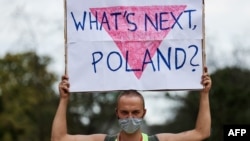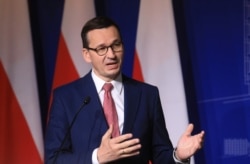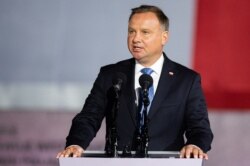Polish leaders on Monday rejected suggestions that LGBT people in Poland are facing any kind of discrimination or depravation of rights, following the publication of an open letter from 50 ambassadors and international representatives expressing their support for "challenges faced" by the LGBT communities in the nation.
The ambassadors' appeal, coordinated by Belgium's embassy in Poland and published Sunday, comes as an increasingly visible LGBT community in Poland has faced a backlash from the right-wing government, many local communities and the Catholic Church.
"Human rights are universal, and everyone, including LGBTI persons, are entitled to their full enjoyment," the letter said, using the acronym for lesbian, gay, bisexual, transgender and intersex people.
At a news conference Monday, Polish Prime Minister Mateusz Morawiecki said he agreed that every person deserves respect but that he completely disagreed with the ambassadors' claim that LGBT people were being deprived of that.
Morawiecki said no one needs to teach Poland tolerance, "because we are a nation that has learned such tolerance for centuries, and we have given many testimonies to the history of such tolerance."
Poland's ruling party leaders, including the president, have cast the movement for civil rights for LGBT people as a threat to traditional families. President Andrzej Duda won a second term this year after calling LGBT rights an "ideology" more dangerous than communism.
Meanwhile, dozens of towns in conservative parts of eastern and southern Poland have passed mostly symbolic resolutions declaring themselves to be "LGBT-free zones," free of LGBT ideology.
From her Twitter account Sunday, U.S. Ambassador to Poland Georgette Mosbacher tweeted, "Human Rights are not an ideology — they are universal, 50 Ambassadors and Representatives agree."
The ambassadors' letter paid tribute to the work of the LGBT community in Poland as it seeks to raise awareness about the challenges it faces. The letter was signed by the ambassadors of the United States, many European countries, including Germany, Ukraine and Britain, and other nations such as Japan and Australia.
The letter was also signed by representatives in Poland of the United Nations, the European Union, the Organization for Security and Cooperation in Europe, and the Community of Democracies, which is based in Warsaw.







